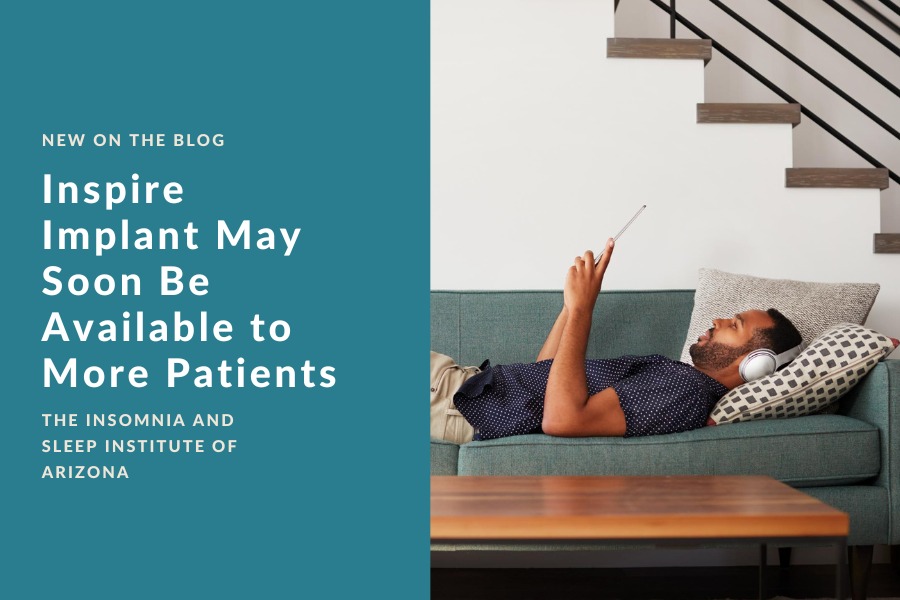Obstructive sleep apnea (OSA) is the most common kind of sleep apnea and one of the most common complaints at The Insomnia and Sleep Institute of Arizona. For years, CPAP therapy has been the gold standard in managing OSA, and that is still the case. However, in the rare instance that CPAP is not the right tool for a patient, the Inspire implant may be an option. Bear in mind that patients are required to try CPAP therapy before they are eligible for an implant. If you fall into this category, The Insomnia and Sleep Institute is the Face of Sleep Medicine in Arizona and one of the few clinics that works with surgeons to support this implant.
There are, of course, parameters a patient must align with in order to be eligible for an implant (well beyond having tried and failed at CPAP therapy). This includes limitations on both the apnea hypopnea index (AHI) and body mass index (BMI). The AHI is a scale that sleep doctors use to tell 1) if you have sleep apnea and, if so, 2) how severe it is. Sleep apnea occurs when someone stops breathing for at least 10 seconds while asleep. There is a similar sleep disorder, hypopnea, which happens when there is a partial breath loss for 10+ seconds. Some people wake up briefly, gasping, when they have sleep apnea or hypopnea, but that isn’t always the case.
OSA Matters
If your doctor suspects sleep apnea, you will undergo a sleep study in a sleep center. During this time, you’ll be connected to equipment that monitors breathing patterns, blood oxygen levels, heart rate, brain waves, and vital signs. This test is a polysomnography and some patients might be given a device to wear at home to analyze blood oxygen levels and breathing, too. These tests are designed to let your doctor know how often throughout the night you have apnea or hypopnea.
AHI is determined by how many times these instances occur in one night, which is divided into sleep hours. For “normal sleep,” a person has less than five AHI events per hour. Mild sleep apnea is when there is an AHI of 5 – 14 events per hour. A person has moderate sleep apnea if there are 15 – 29 events per hour. Sleep apnea is severe if the AHI includes 30+ events per hour. Kids are less likely to have sleep apnea in general, particularly moderate or severe, so an AHI of just 1+ is considered unusual for a child. Children typically require treatment for sleep apnea if their AHI is 5+. We treat children as young as two as well as adults at our institute.
Implant Options
The FDA’s recent Breakthrough Therapy program is designed to help healthcare providers and patients get quicker access to the latest technologies, like the Inspire implant. Specifically, the program targets treatments that are effective when it comes to addressing “debilitating” conditions and diseases. This is why Inspire Medical is focusing on this program. According to the president and CEO of the company,
We plan to submit to the FDA our request to increase Inspire therapy’s indication by expanding the upper limit of AHI to 100 events per hour from 65, as well as raising the BMI warning in our indication to 40 from 32 … our application for this expanded indication recently received Breakthrough Device Designation from the FDA, thereby reducing the review time.
So, what does this mean for you? If you did not qualify for the Inspire implant in the past due to BMI and/or AHI issues, you may qualify now. The FDA just granted Inspire approval for new sensing silicone leads and stimulation, too. This will help speed up manufacturing as well as system implantation. This means better long-term performance and reliability for patients. The US launch of the new leads happened late last year.
Is Inspire for You?
Inspire is gearing up for the US launch of the Bluetooth-enabled remote for patients, which is key to its SleepSync program. The tech for OSA management just keeps getting better, so if you have tried CPAP and failed or were not approved for the Inspire implant in the past, check with Phoenix’s leading sleep experts today. Inspire implant in Phoenix may be the tool you need for comprehensive OSA management. Contact The Insomnia and Sleep Institute today by calling the office or completing the online contact form.





